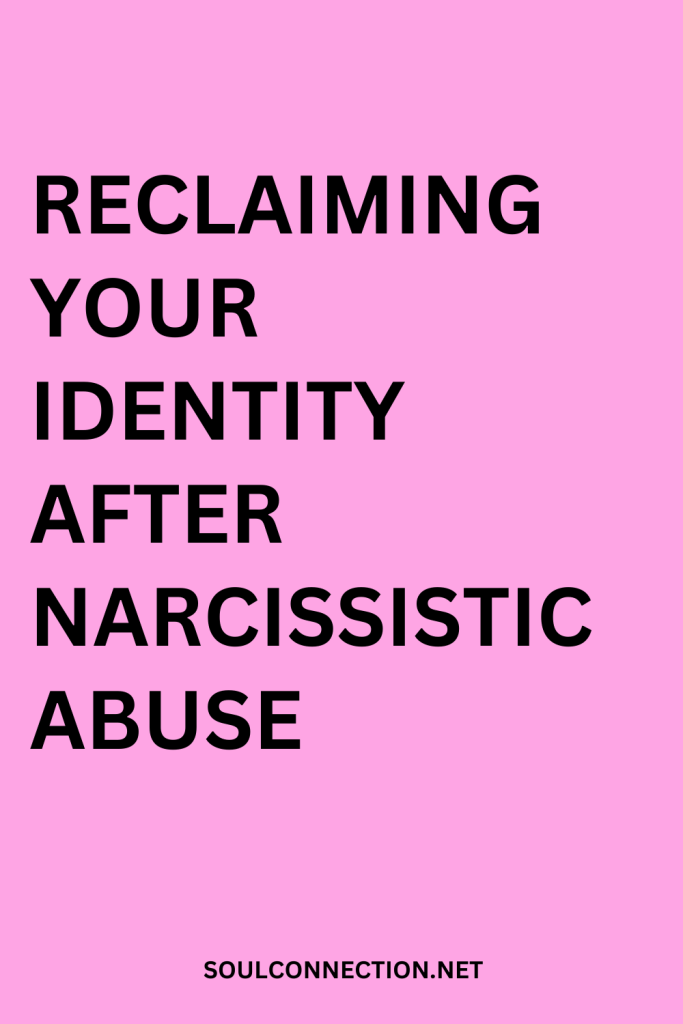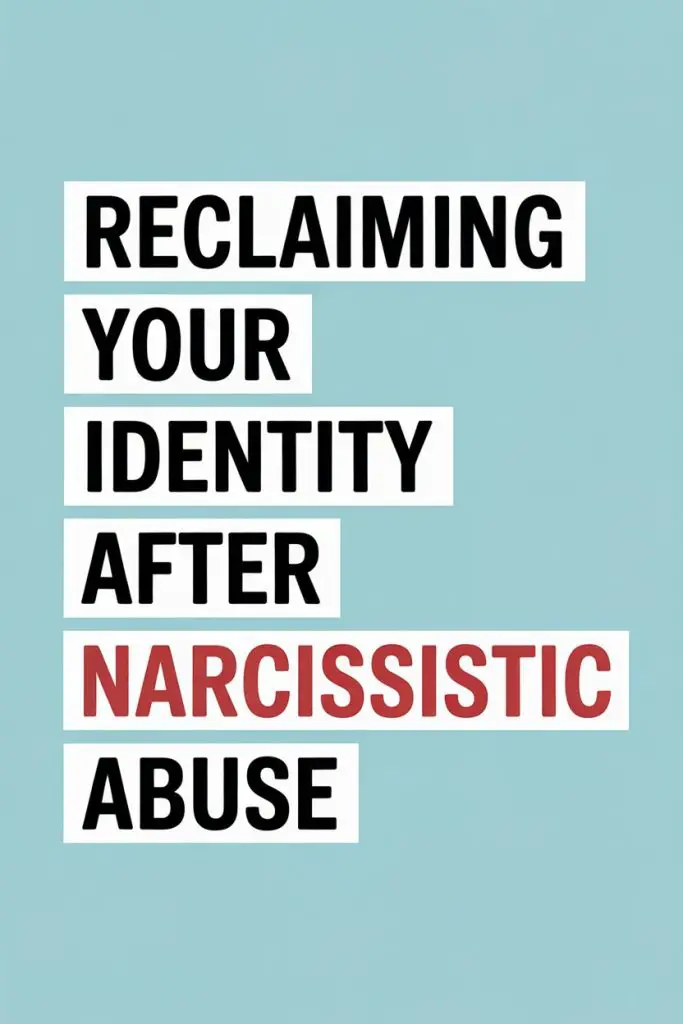Losing yourself in a relationship with a narcissist can feel a bit like waking up in someone else’s clothes, in a house with your name on the mailbox, but none of your favorite snacks in the kitchen.
Getting back to yourself? That’s the real victory lap. Ready for a bit of gentle demolition and a lot of glorious rebuilding? You’re in the right place.
Why Narcissistic Abuse Leaves You Disoriented
Living with a narcissist is a little like being gaslit by a malfunctioning GPS: you start to question your direction, your memory, even your ability to read street signs.
Narcissistic abuse doesn’t just bruise your feelings—it warps your sense of self. You might find yourself apologizing for things you didn’t do, staying small to avoid explosions, or believing you’re “too sensitive” just because your partner said so (for the hundredth time).
Over time, this erodes your confidence, your spark, and eventually, your sense of who you are. The narcissist’s needs, moods, and opinions become the weather system you plan your days around.
When the storm finally passes (or you run for the hills), what’s left? Usually, a very brave person who’s wondering, “Wait… who am I now?”
Recognizing the Damage to Your Self-Concept
If you’re reading this, there’s a decent chance you’ve been out of the narcissist’s gravitational pull for a bit—or maybe you’re just plotting your escape. Either way, acknowledging the impact is downright heroic.
You might notice:
- Getting dressed feels like a pop quiz. What do you even like to wear?
- Making decisions stresses you out. Can you trust your own judgment?
- Old friends don’t quite feel like your crowd anymore. Did you change, or did the narcissist change you?
- Your inner critic sounds suspiciously like your ex. (Spoiler: That’s not your voice.)
No, you’re not imagining it. Narcissistic abuse is sneaky. It seeps into your self-esteem, your hobbies, even your Netflix queue.
That doesn’t mean you’re broken—it means you need time and a little TLC to remember who you are.
Rebuilding Trust in Your Own Reality
Gaslighting is the narcissist’s party trick: they’ll convince you that your memories are wrong, your feelings are overblown, and your needs are selfish. Soon, you stop trusting your own senses.
Time to flip the script.
Start by writing things down. Seriously. Keep a journal—or a note in your phone—of your thoughts, decisions, and feelings. This isn’t about “keeping score” or documenting every passing feeling.
It’s about creating a paper trail of your own reality, so you can look back and realize, “Hey, I did know what was happening.”
Try reality checks with trusted friends. If something feels off, text your most grounded mate and ask, “Does this sound as bonkers to you as it does to me?”
Over time, you’ll retrain your brain to trust your own perspective again.
Rediscovering Your Likes and Dislikes
Once upon a time, you had opinions. Maybe you loved pineapple on pizza or hated camping or secretly adored a band no one else remembered. Chances are, the narcissist steamrolled all that.
Want those quirks back? Try little experiments. Order the weird menu item. Pull out that old playlist you abandoned. Take a class, even if you’re the oldest (or least coordinated) person there.
It feels awkward at first. Like putting on shoes you haven’t worn since high school. But as you try things, notice what actually lights you up.
You might surprise yourself. Or you might just find out you still can’t stand pineapple pizza. Both are wins.
Reconnecting With Safe People
Narcissists love to isolate their partners. After all, if you’re surrounded by people who cheer you on, it’s harder to stay under someone else’s thumb.
Reach out to friends or family you trust, even if it’s been ages. You don’t need a dramatic “I’ve seen the light!” speech. A simple “Hey, miss you—fancy a coffee?” works wonders.
Community comes in many forms.
Maybe it’s an old mate, a sibling, or the neighbor who always says hi. Maybe you join a support group (in person or online) where you don’t have to explain why you left, or how bad it got.
You just get to be you, no performance required.
Setting Boundaries Without Guilt
Boundaries. The word alone can feel itchy if you’ve been conditioned to believe that your needs are optional (or annoying).
Start small. Think of boundaries as fences, not walls. You’re not locking anyone out—you’re just protecting your garden from being trampled.
Practice “no” in low-stakes scenarios. Try it at the coffee shop. Or with a telemarketer. Then, work your way up. Every time you set a boundary, you’re telling yourself you matter.
Expect a bit of pushback, especially from folks who liked you better as a doormat. Hold steady. The discomfort passes. Your self-respect, on the other hand, is here to stay.
Taming the Inner Critic
Narcissists are experts at outsourcing their own self-loathing. They hand it to you like an unwanted party favor: “Here, you carry my shame.”
Before long, that voice becomes your own, complete with snarky commentary.
Start noticing when your inner dialogue sounds suspiciously familiar. Would you say those things to your best friend? If not, it’s time to give that voice a name (Petty Polly? Negative Norman?) and tell it to take several seats.
Try gentle affirmations. Yes, it feels dorky. Yes, it works. Start with “I’m allowed to exist as I am.” Move up to “My needs matter.”
Eventually, those phrases land less like punchlines and more like truths.
Finding Joy in Solitude
Freedom from narcissistic chaos can leave you with a weird kind of silence. After all that noise, being alone might feel uncomfortable—like a too-quiet house after the world’s loudest party.
Lean in to that quiet. You’re not “too much” when you’re alone. You’re not boring, either. Solitude is where you get to listen to your own thoughts, or just enjoy the absence of someone else’s.
Try solo activities, even if they’re small. Read in bed. Go for a walk. Watch a movie you know the narcissist would have hated.
The goal here isn’t to become a hermit (unless you fancy that). It’s to teach your nervous system that your own company is not just safe, but actually pretty nice.
Giving Yourself Permission to Grieve
Narcissistic relationships come with a rollercoaster of emotions—love-bombing, discard, confusion, hope.
Walking away means you’re not just mourning a partner; you’re letting go of the future you thought you’d have, and maybe the person you became to survive.
Allow yourself to grieve. Write a letter you’ll never send. Watch a sappy film and ugly-cry into your sleeve.
You’re not weak—you’re letting old pain move through, instead of camping out in your body rent-free. It’s not a linear process.
Some days you’ll feel weightless. Others, you’ll carry boulders. Both are normal.
Reimagining Your Future
Now that the narcissist isn’t scripting your every move, you’ve got a blank page ahead. Terrifying? Yes. But also, this is when things get interesting.
Take baby steps. What’s one thing you’ve always wanted to try or learn? Sign up for that art class, or dust off your passport, or finally get the tattoo you always wanted.
Don’t worry about getting it “right.” The future doesn’t need to be spectacular to be yours.
You’re allowed to dream small, silly, or sideways. Your only job here is to build a life that feels like it actually fits.
Making Space for Healthy Love
After narcissistic abuse, “healthy” might sound suspiciously like “boring.” Or risky. Or just plain alien.
Healing means you might fumble through new relationships, expecting fireworks or drama. When things are calm, it’s easy to mistake that for dullness. Stay curious.
Notice how you feel around different people. Does your body relax or tense up? Does your voice come out stronger or shrink away?
Healthy love isn’t perfect. It’s just… kind. Sustainable. You feel safe being yourself, even on your off days. You don’t have to twist yourself into a pretzel to be “enough.”
Give yourself time to trust again. The right people will stick around.
You’re Not Who You Were—And That’s a Good Thing
Emerging from narcissistic abuse isn’t about “getting back” to who you were before. That person didn’t have your hard-won wisdom, your boundaries, or your sense of humor about red flags the size of a house.
This is about becoming someone new.
Someone who can spot manipulation before it takes root. Someone who knows that peace is worth more than approval. Someone who picks their own pizza toppings, no matter what.
No, it’s not easy. But it’s worth it. You’ve come through the storm, and while the world may feel unfamiliar, it’s yours for the taking—snacks, playlists, and all.


